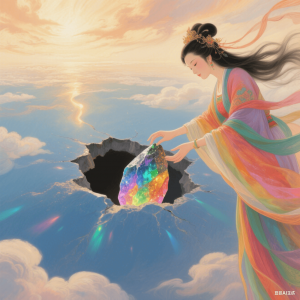
Nüwa
I. Introduction
Nüwa (女娲) is a prominent figure in ancient Chinese mythology, revered as a creator deity and the mother of humanity. She is often depicted as a human with a serpent's body, symbolizing her connection to the natural world and her role in shaping the universe.
II. Historical Background
Nüwa is believed to be one of the "Three Sovereigns" (三皇), alongside Fuxi (伏羲) and Shennong (神农), who played crucial roles in the early creation and governance of the world. Her mythological origins can be traced back to various ancient texts, including the "Huainanzi" (淮南子) and "Fengsu Tongyi" (风俗通义), which detail her creation of humans and her efforts to mend the sky.
III. Mythological Stories
- Creation of Humanity:
- According to legend, Nüwa molded humans from yellow clay, giving them life. As the task was laborious, she later used a rope to flick mud, creating more people in a quicker manner. This act is said to have established the distinction between the rich and the poor.
- Mending the Sky:
- One of the most famous stories about Nüwa involves her mending the sky. It is said that the water god Gonggong (共工) and the fire god Zhurong (祝融) fought fiercely, causing the sky to collapse and the earth to crack. Nüwa, seeing the suffering of humanity, took action. She melted five-colored stones to mend the sky, cut off the legs of a giant turtle to support the heavens, and killed a black dragon to stop the floods.
IV. Cultural Significance
- Symbol of Creation and Protection:
- Nüwa is often seen as a symbol of creation, protection, and maternal care. Her actions in mending the sky and protecting humanity from disaster reflect her nurturing and heroic qualities.
- Marriage and Family:
- Nüwa is also associated with the establishment of marriage and family systems. She is sometimes depicted as the sister or wife of Fuxi, and together they are credited with creating the rules and customs of marriage.
- Music and Art:
- Nüwa is credited with creating the sheng (笙), a traditional Chinese musical instrument, further highlighting her contributions to culture and the arts.
V. Modern Legacy
Nüwa's story continues to be celebrated in modern China. In some regions, festivals are held in her honor, where people sing, dance, and pray for her blessings. Her image is also featured in various forms of art, literature, and media, serving as a reminder of the ancient wisdom and values embedded in Chinese mythology.
VI. Conclusion
Nüwa's mythological legacy is a testament to the enduring power of creation myths in shaping cultural identity and values. Her stories, which combine elements of heroism, nurturing, and cultural innovation, continue to inspire and captivate audiences around the world.